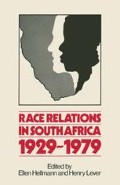Abstract
Heraclitus tells us that everything is always changing, that the world is continually in flux. Says Bertrand Russell: ‘The metaphysics of Heraclitus are sufficiently dynamic to satisfy the most hustling of moderns.’ In a Heraclitic world ‘perpetual change was to be expected’.1
I have tried to reflect in this chapter only my own intuition about change in our literary situation. I did not intend to write an academic piece.
Access this chapter
Tax calculation will be finalised at checkout
Purchases are for personal use only
Preview
Unable to display preview. Download preview PDF.
Notes
Bertrand Russell, History of Western Philosophy (Allen & Unwin, London, 1971), pp. 61–2.
This quote and those that follow are from N. P. van Wyk Louw, Liberale Nasionalisme (Nasionale Boekhandel Bpk., Cape Town, 1958), p. 9 et seq.
Nadine Gordimer, The Black Interpreters (Sprocas/Ravan, Johannesburg, 1973), p. 5.
Claude Wauthier, The Literature and Thought of Modern Africa (Pall Mall Press, London, 1966), p. 32.
Sydney Sipho Sepamla, Hurry up to it (Ad. Donker, Johannesburg, 1975), p. 25.
From Adam Small, Oh Wide and Sad Land (Maskew Miller, Cape Town, 1975), pp. 126–31.
From N. P. van Wyk Louw, Tristia (Human & Rousseau, Cape Town, 1962), pp. 114–17.
D. J. Opperman, Digters van Dertig (Nasionale Boekhandel Bpk., Cape Town, 1953), p. 163.
N. P. van Wyk Louw, Die Halwe Kring (Nasionale Boekhandel Bpk., Cape Town, 1967), p. 40. English translation by Adam Small.
N. P. van Wyk Louw, Lojale Verset (Nasionale Boekhandel Bpk., Cape Town, 1939), p. 169.
George Steiner, Language and Silence (Penguin, London, 1969), p. 140.
S. V. Petersen, Die Enkeling (Maskew Miller, Cape Town, 1944), p. 13. English translation by Adam Small.
Peter Abrahams, Tell Freedom (Faber and Faber, London, 1954), pp. 310–11.
Peter Wilhelm and James Polley, Poetry South Africa (Ad. Donker, Johannesburg, 1976), p. 10.
Martin Versfeld in Education for Reality in Africa (Mambo Press, Gwelo, 1963), p. 15.
Editor information
Copyright information
© 1979 South African Institute of Race Relations
About this chapter
Cite this chapter
Small, A. (1979). In the Crucible: A Situation of Change for South African Literature. In: Hellmann, E., Lever, H. (eds) Race Relations in South Africa 1929–1979. Palgrave Macmillan, London. https://doi.org/10.1007/978-1-349-16413-4_10
Download citation
DOI: https://doi.org/10.1007/978-1-349-16413-4_10
Publisher Name: Palgrave Macmillan, London
Print ISBN: 978-1-349-16415-8
Online ISBN: 978-1-349-16413-4
eBook Packages: Palgrave Political & Intern. Studies CollectionPolitical Science and International Studies (R0)

